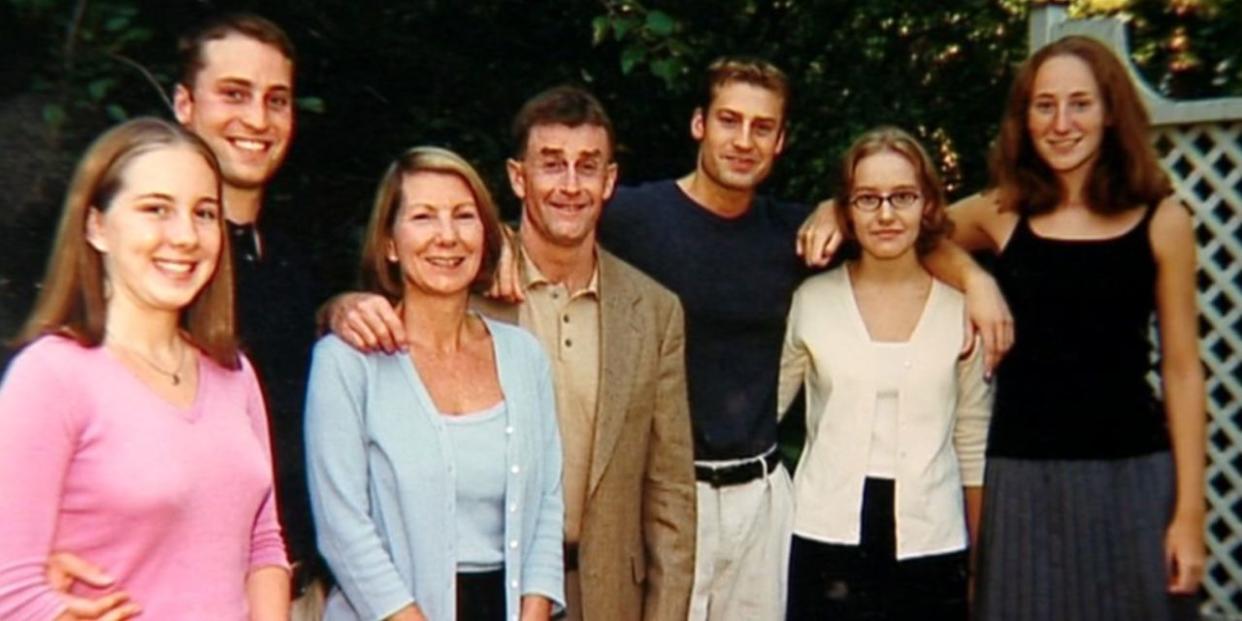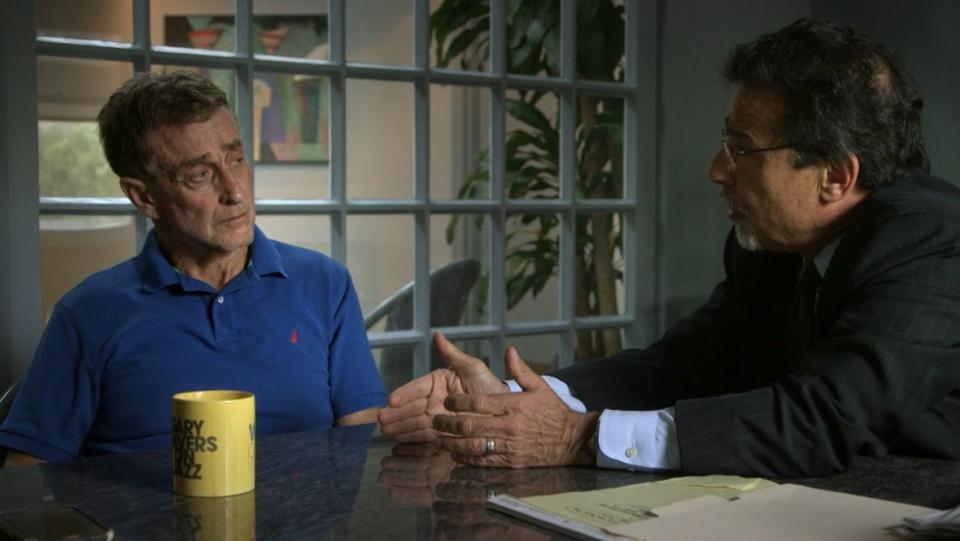Answering 7 BIG questions raised by The Staircase

Warning: This article contains spoilers for all 13 episodes of The Staircase on Netflix
"I had never been looking for the truth," The Staircase director Jean-Xavier de Lestrade told Digital Spy recently, addressing the lack of easy answers offered up by his 13-episode Netflix true-crime series.
Shot over the course of 16 years, The Staircase follows novelist Michael Peterson as he is charged with the murder of his wife Kathleen, then released from jail – after eight years – when a key witness is revealed to have committed perjury.
But the fallibility of the evidence doesn't prove Michael's innocence, with de Lestrade insisting that he never intended to either demonstrate or disprove Michael's guilt, but was looking instead to document the processes of the US justice system.

The Staircase closes with Michael taking an 'Alford plea' rather than face a retrial which could put him back behind bars – he does not actually admit guilt, but still pleads guilty, in the acknowledgement that the evidence is substantial enough for a conviction.
This open-ended conclusion left a number of big questions still hanging, and you can probably guess where we're going to start.
Related: The Staircase raises an all-important question for true-crime fans
1. Did Michael Peterson kill his wife Kathleen?

Let's face it, this is the biggie – the question on which the entirety of The Staircase hinges. But the truth is, we may never know if Michael beat Kathleen to death, if she tripped and fell down by chance, or if he pushed her.
We can probably rule out death-by-blow-poke, though: as Michael's lawyer David Rudolf points out in a post on his website, the 'missing' object that the prosecution alleged was the likely murder weapon during Michael's trial in 2003 had actually been found and photographed by police – with "no blood" and "no dents" – in June of 2002, after Kathleen died.
Michael did technically take a guilty plea, which Kathleen's sister Candace took as admission that he did indeed commit murder. Michael, though, insisted he was simply done fighting a system that he considered to be corrupt – one that he did not trust to find him innocent, even with the crucial blood-spatter evidence used in his original trial now having been disregarded.
As for The Staircase filmmaker de Lestrade? "I can't tell you if [Michael is] innocent or not," he said in a recent interview with The Wrap. "I didn't know at the time of the start [of filming] and I don't know, 16 years later."
De Lestrade did admit to Digital Spy, however, that he thinks Michael would have been found not guilty if he'd pushed on and submitted himself to a second trial.
2. Did an owl kill Kathleen?

Ah yes, the other chief suspect. The "owl theory" might sound like a hoot, but it's actually pretty convincing when you dig into the specifics.
The theory goes that an owl attack was the cause of Kathleen's head injuries, with the bird of prey's unexpected assault landing her at the bottom of the staircase.
Larry Pollard, a lawyer who lived next door to the Petersons, is believed to be the originator of the owl theory, insisting that Kathleen's head wounds – which formed a trident pattern – looked as though they were inflicted by claws or talons.
What's more, microscopic feathers were found in Kathleen's hand, along with some of her own hair – evidence, Pollard says, that she yanked out some of her own hair while attempt to dislodge the owl.
Owl attacks aren't actually all that uncommon, either. As Vulture notes, while covering the Peterson case, NBC's Dateline interviewed a local man who had definitely been attacked by an owl – the incident was caught on surveillance cameras, leaving the man with extensive bleeding.
The theory is barely touched on in The Staircase, with de Lestrade explaining that, since the idea of an owl attacking Kathleen was never presented in court, he didn't feel the need to address it in his series.
For more on this theory, we recommend listening to the first episode of the podcast Criminal, titled 'Animal Instincts'.
3. Did Kathleen know about Michael's bisexuality?

Unclear.
Michael, it's revealed in the series, is bisexual and admits to having extra-marital relations with men while wed to Kathleen. (He insists he never slept with any other women.)
His communications with a male escort are even entered into evidence in the trial, with the argument that they disprove Rudolf's assertion that Michael and Kathleen were happily married.
For his part, de Lestrade believes this evidence was prejudicial. He told us: "For sure, what the prosecution tried to do during the trial was say, 'OK, we don't have the evidence to prove that he killed his wife. But we are trying to prove to you that he is the kind of person who may have killed his wife.'"
Michael always insisted that Kathleen knew about both his bisexuality and his other relationships, while the prosecution argued that these discoveries could have sparked an argument which led to her death.
In episode 13, Michael again states to a journalist that his wife was "comfortable" with the truth, but when asked if they discussed his flings, he added: "Not really... in an oblique type of way."
4. Did Michael stand to get rich off of Kathleen's death?

One other possible motive for Kathleen's murder put forward by the prosecution was the $1.5 million life insurance policy in her name.
David Rudolf has recently contended that the insurance policy was actually issued before Kathleen ever met Michael, with her first husband, Fred, named as the beneficiary – not Michael. (In 2004, the policy was in fact paid to Kathleen's daughter Caitlin Atwater and her biological father.)
Atwater had also filed a wrongful-death lawsuit against Michael in 2003 after he was found guilty of murder, with the case being settled in 2007 to the cost of $25 million.
By this stage, though, Michael was "indigent" (a word used repeatedly in The Staircase, it means the subject is penniless) and couldn't pay up. Whichever way you look at it, Michael did not profit financially from his wife's death.
5. Was Michael having an affair with Elizabeth Ratliff?

A big complication in the Peterson case arises when it emerges that Michael's old friend and neighbour Elizabeth Ratliff was also found dead at the foot of a staircase some years before Kathleen died. An unlikely coincidence? Or proof that he killed both women?
Michael and Kathleen ended up adopting Elizabeth's daughters Margaret and Martha – now orphans, with their father having previously died in a military operation overseas. (Michael even argued that the financial burden of raising two extra children was proof that, again, he had nothing to gain from killing Elizabeth.)
But suspicions have been levelled that Michael and Elizabeth were having an affair and that he is actually Margaret and Martha's real father, with one Twitter user even commenting on the apparent physical similarity between Margaret and Michael's (biological) son Todd.
Can we all just take a pause and admit that these two are clearly and without a doubt siblings? We just not gonna talk about it? #TheStaircase pic.twitter.com/ywehwrsIWO
- Janet Chloe (@JanetChloeBuzz) June 13, 2018
However, according to David Rudolf, a DNA test was conducted by the prosecution during the trial – something not seen in The Staircase – and Margaret is not Michael's biological daughter. (Though that doesn't definitively rule out the possibility of an affair between Michael and Elizabeth, of course.)
6. What happened to Duane Deaver?

The testimony of blood spatter analyst Deaver was crucial in convincing the jury that Michael should be convicted of first-degree murder and sentenced to life in prison.
Deaver argued that the blood spatters on the walls in the Peterson home, at the foot of the stairs where Kathleen was found, were consistent with a blunt force trauma injury. He even conducted 'experiments' to replicate the blood spatter found on Michael's shoes and inside his shorts, to 'prove' that he was standing over Kathleen as he, allegedly, struck her on the head.
David Rudolf later claims that he spoke to one juror who informed him that, while the jury was originally split, it was the 'evidence' presented by Deaver that most heavily played into their final decision.
However, after Michael had already spent eight years in jail, it was revealed that Deaver had misrepresented his qualifications, his experience and the so-called evidence that he presented in the trial.

The conviction of another murder suspect, Greg Taylor, was thrown out as a result of Deaver's failure to report blood test results that would've cast doubt on his guilt... though only after Taylor had served 19 years in jail for a murder he did not commit.
After a hearing, Judge Orlando Hudson Jr ruled that Deaver had similarly perjured himself during the Peterson trial. Deaver was initially suspended from and eventually fired by the SBI (State Bureau of Investigation) in 2011, a year after Taylor was freed. But there's a twist to this sordid tale...
In 2014, the State Human Resources Commission actually ruled that Deaver was wrongly terminated and that, prior to the judge's ruling that Deaver committed perjury at the Peterson trial, he should simply have been demoted and had his pay cut.
The SBI was forced to rehire Deaver and award him 30 months' worth of backpay. It's unclear if he still works for the agency in 2018. He does, however, face further accusations of having manufactured evidence for other trials.
7. Will there be a second season of The Staircase?

The short answer is... no.
"Now, the judge has given the final answer, and nobody can come back to that," de Lestrade told us. "So that's the end of the process for us, to shoot."
Indeed, with Michael having taken an Alford plea, his legal woes do appear to be over. He has effectively already pleaded guilty to manslaughter, and served eight years in jail as a result of his original conviction – more than the maximum sentence for that particular crime.
'Double jeopardy' prevents an accused person from facing the same (or similar) charges, and on the same facts, following a valid acquittal or conviction.
So even if new evidence is uncovered, it's probable that this defence could prevent Michael from being tried for the killing of Kathleen a second time, since his second 'conviction' was ruled valid in a court of law.
The Staircase is streaming now on Netflix.
Want up-to-the-minute entertainment news and features? Just hit 'Like' on our Digital Spy Facebook page and 'Follow' on our @digitalspy Instagram and Twitter account.
('You Might Also Like',)

 Yahoo News
Yahoo News 
